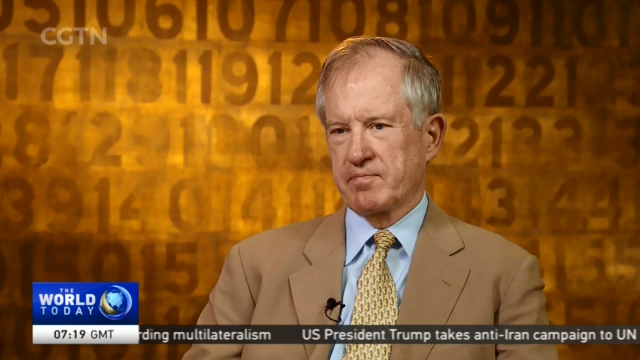
16:43, 26-Sep-2018
China-US Trade Tensions: Is Washington really engaging in 'trade bullyism'?
Updated
16:14, 29-Sep-2018
02:47

US President Donald Trump has said trade wars "are easy to win". It that really the case? And who is gaining an upper hand in the US-China trade dispute? My colleague in Washington, Wang Guan interviewed Nick Lardy, senior fellow at the Peterson Institute for International Economics. Wang started by asking him about Beijing's recent language regarding Washington's trade policy.
WANG GUAN CGTN ANCHOR "In the white paper, the Chinese government called the US sanction 'trade bullyism'-a pretty strong wording we haven't heard from Beijing for a while."
NICHOLAS LARDY, SENIOR FELLOW PETERSON INSTITUTE FOR INT'L ECONOMICS "Well, I think there's some justification on that. The United States is still the world's biggest economy. It's a very big market, and restricting access to our market does impose costs on other countries. And the "bullyism" has several dimensions. It includes extraterritoriality applications of U.S. law and other countries and so forth, that many countries around the world find objectionable, not just China."
WANG GUAN CGTN ANCHOR "How do you think the results of the mid-term elections could potentially impact the position of the current administration regarding China, and trade?"
NICHOLAS LARDY, SENIOR FELLOW PETERSON INSTITUTE FOR INT'L ECONOMICS "I think it's very difficult to forecast how the mid-terms might affect trade policies. President Trump still has the legal authority to continue to impose the kinds of tariffs and restrictions he's put in place against China, I don't think he's going to take those off, even if he suffers a significant defeat in the midterms. I think these restrictions will come off when the evidence accumulates, which I think eventually it will, that these tariffs are imposing very high costs on U.S. consumers and U.S. businesses."
WANG GUAN CGTN ANCHOR "In the address to the United Nations, President Trump emphasizes the word 'patriotism' instead of the word globalism. He also said we asked countries around the world to honor our sovereignty. How do you think that would impact global trade going forward?"
NICHOLAS LARDY, SENIOR FELLOW PETERSON INSTITUTE FOR INT'L ECONOMICS "Well, it's very hard to connect something President Trump says with his actual actions. I'm not sure what he means when he asked other countries to respect U.S. sovereignty. I think the United States does not respect other country's sovereignty in some cases. And I think we should. And I don't think there are any serious cases where other countries are not respecting U.S. sovereignty."
Wang Guan: "Dr. Lardy, thank you for your time."

SITEMAP
Copyright © 2018 CGTN. Beijing ICP prepared NO.16065310-3
Copyright © 2018 CGTN. Beijing ICP prepared NO.16065310-3